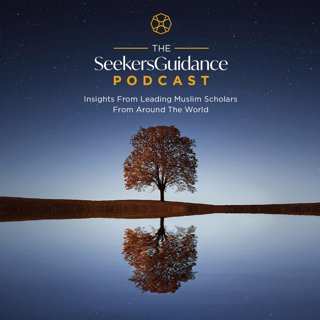
Look At Everything as a Blessing from Allah and Nurture Gratitude – Shaykh Faraz Rabbani
In this Friday sermon, Shaykh Faraz Rabbani calls Muslims to recognize the blessings that Allah bestowed upon us. Sometimes we may take some of the daily blessings for granted or not notice them at all. However, the way of the Prophet Muhammad (peace and blessings be upon him) was to recognize the blessings of Allah and express gratitude to Allah for them. Shaykh Faraz reminds us of the multiple blessings that Allah has granted us and how great they are. He points out the great blessing of being Muslim, having clean water, and many of the daily facilitation that we have. Shaykh Faraz recounts the example of the Prophet (peace and blessings be upon him) who ate the leftover vinegar from food and expresses great gratitude for it by saying: "what excellent sauce vinegar is". Shaykh Faraz then urges everyone to express gratitude for the blessings we have. He highlights that if we are having difficulty in worship, that it may be a result of lacking gratitude. He advises us to say "Alhamdulillah" while thinking of specific blessings, especially when faced with hardship. So we should recognize the blessings of Allah and express gratitude to Him for it so that we may attain the love of Allah. This Friday sermon was delivered by Shaykh Faraz Rabbani at the International Muslim Organization of Toronto (IMO) on the last Friday of Ramadan 2017.
28 Juni 201741min

27: Sincerity, Vigilance, Meditation, Reflection on Death – Renewing Religion: Overview of Ghazali’s Ihya – Ustadh Amjad Tarsin
In this lesson of Renewing Religion, Ustadh Amjad Tarsin, reflects upon the chapters from Imam Ghazali’s Ihya on sincerity, self examination, meditation and reflecting on death. Ustadh Amjad begins with the chapter on sincerity, explaining that true sincerity can lead habits to be acts of worship if they are done with the right intentions. Many of the companions would actually hide a lot of their acts of good and worship so that they would ensure its sincerity. Thus sincerity is the defining factor of our actions that determine whether our actions will be accepted or not. The second chapter that is examined in this lesson is that on self examination. Ustadh Amjad mentions that many of the righteous would remember their mistakes years after so that it would push them to improve to the better. The Prophet, peace be upon him, says if you do not feel shame then do as you will. Here, he points to the importance of self examination and understanding that all your actions have a consequence. Ustadh Amjad gives an overview of the chapter on the importance of meditation and reflection. Spending time in nature calms the soul and really allows our internal sounds to quiet so we can start to think about deeper matters. The second type of reflection that one should seek is reflecting on blessings and be thankful for them. The third, is reflecting upon the nature of the world, life, death and the hereafter. This allows a person to prepare for meeting their Lord. Lastly, reflecting upon death is the last chaper of the Ihya. Reflecting upon death forces people to get done now what they would have otherwise delayed. That is why the Prophet, peace be upon him, advises us to take advantage of our free time before we become busy. Imam Ghazali likens every breath one takes to a prescious jewel becuase it can never be brought back once it is taken. The fruit of all this will be realized at the time of death if one has lived their life preparing for it then they will welcome it when the time comes but if they have lived their life headless of it they will be terrified of dying. In this brief overview of Imam Ghazali’s opus magnum, Ihya Ulum al-Din (Renewing the Religious Sciences), this series will serve as blueprint for how the believer can bring to life their religion. It will aim to help the believer to not just practice the form of the religion properly, but to also practice it with excellence. Join our Ramadan 2017 program: #RamadanRenewal, in-person at SeekersGuidance Toronto or online through the SeekersGuidance Global platform. For more details, visit: http://seekershub.org/ramadan2017. Checkout all of the SeekersGuidance podcasts by visiting https://seekersguidance.org/podcasts/
25 Juni 201754min

25: Reflection & the End of Life – Renewal by the Book: Quran Tafsir Based on Imam Ghazali’s Ihya – Shaykh Faraz Rabbani
In this lesson of Renewal by the Book, Shaykh Faraz Rabbani, reflects upon verses of the Quran that correspond to the chapter on reflection and the end of life from Imam Ghazali’s Ihya. إِنَّمَا مَثَلُ الْحَيَاةِ الدُّنْيَا كَمَاءٍ أَنزَلْنَاهُ مِنَ السَّمَاءِ فَاخْتَلَطَ بِهِ نَبَاتُ الْأَرْضِ مِمَّا يَأْكُلُ النَّاسُ وَالْأَنْعَامُ حَتَّىٰ إِذَا أَخَذَتِ الْأَرْضُ زُخْرُفَهَا وَازَّيَّنَتْ وَظَنَّ أَهْلُهَا أَنَّهُمْ قَادِرُونَ عَلَيْهَا أَتَاهَا أَمْرُنَا لَيْلًا أَوْ نَهَارًا فَجَعَلْنَاهَا حَصِيدًا كَأَن لَّمْ تَغْنَ بِالْأَمْسِ ۚ كَذَٰلِكَ نُفَصِّلُ الْآيَاتِ لِقَوْمٍ يَتَفَكَّرُونَ وَاللَّهُ يَدْعُو إِلَىٰ دَارِ السَّلَامِ وَيَهْدِي مَن يَشَاءُ إِلَىٰ صِرَاطٍ مُّسْتَقِيمٍ The example of [this] worldly life is but like rain which We have sent down from the sky that the plants of the earth absorb - [those] from which men and livestock eat - until, when the earth has taken on its adornment and is beautified and its people suppose that they have capability over it, there comes to it Our command by night or by day, and We make it as a harvest, as if it had not flourished yesterday. Thus do We explain in detail the signs for a people who give thought. And Allah invites to the Home of Peace and guides whom He wills to a straight path [Quran, 5:24-25] This verse is directed to those who seek the world and contentment in its pleasures, warning that whenever you seek contenment in this life it will disappoint you. Conversely, Allah invites all of us to the place that will never perish or dissapoint us and that is the Home of Peace. To respond to Allah’s invitation one needs to follow the straight path. The Prophet, peace be upon him, invited us to think abundantly about the hereafter and reflect upon death. The reflection upon death should lead one to understand the importance of working towards it and remaining steadfast on the straight path. Shaykh Faraz advises that people read the translation of the final book of the Ihya which was beautifully translated by Shaykh Abdel Hakim Murad. In this series Shaykh Faraz, and the other scholars and teachers will be looking at points of reflection from key verses in the Quran. The series will follow the thematic order of Imam Ghazali’s Ihya Ulum al-Din (Renewing the Religious Sciences). The aim is to connect the key verses of guidance from the Book of Allah with the blueprint of renewal, the Ihya, so that we experience a renewal by The Book. Join our Ramadan 2017 program: #RamadanRenewal, in-person at SeekersGuidance Toronto or online through the SeekersGuidance Global platform. For more details, visit: http://seekershub.org/ramadan2017. Checkout all of the SeekersGuidance podcasts by visiting https://seekersguidance.org/podcasts/
25 Juni 201735min

26: Faith in Divine Oneness & Love and Intimacy – Renewing Religion: An Overview of Ghazali’s Ihya – Shaykh Faraz Rabbani
In this lesson of Renewing Religion, Shaykh Faraz gives an overview of the chapters on faith in Divine Oneness and trusting in Allah as well as the chapters on love, longing and intimacy from Imam Ghazali’s Ihya. Shaykh Faraz begins by explaining that knowing Divine Oneness in its true meaning entails certitude within your heart and trust and reliance upon Allah when it comes to dealing with all that happens. This begins by realizing that Allah is the necessary existant and everything else is dependent on Him. As such everthing in existance is necesserily in a state of slavehood to Allah; this is the essence of Tawheed and understanding Divine Oneness. This understanding should lead one to complete reliance on Allah. Shaykh Faraz reminds us that reliance on Allah is not limited to times of difficulty rather it is only if one relies on Allah in all their times including those of ease can they truly rely on Him during times of difficulty. The Prophet, peace be upon him, says know Allah at the times of ease and He will know you in difficulties. You can know Allah both through consciousness of Him and trust in Him. The action required to actualize this is to continually remember Allah in all of your actions and continually engage in words of remembrance. In this brief overview of Imam Ghazali’s opus magnum, Ihya Ulum al-Din (Renewing the Religious Sciences), this series will serve as blueprint for how the believer can bring to life their religion. It will aim to help the believer to not just practice the form of the religion properly, but to also practice it with excellence. Join our Ramadan 2017 program: #RamadanRenewal, in-person at SeekersHub Toronto or online through the SeekersGuidance Global platform. For more details, visit: http://seekershub.org/ramadan2017. Checkout all of the SeekersGuidance podcasts by visiting https://seekersguidance.org/podcasts/
25 Juni 201756min

24: Love of Allah & Sincerity – Renewal by the Book: Quran Tafsir Based on Imam Ghazali’s Ihya – Shaykh Faraz Rabbani
In this lesson of Renewal by the Book, Shaykh Faraz reviews verses from the Quran that correspond with the chapters on love of Allah and sincerity in Imam Ghazali’s Ihya. يَا أَيُّهَا الَّذِينَ آمَنُوا مَن يَرْتَدَّ مِنكُمْ عَن دِينِهِ فَسَوْفَ يَأْتِي اللَّهُ بِقَوْمٍ يُحِبُّهُمْ وَيُحِبُّونَهُ أَذِلَّةٍ عَلَى الْمُؤْمِنِينَ أَعِزَّةٍ عَلَى الْكَافِرِينَ يُجَاهِدُونَ فِي سَبِيلِ اللَّهِ وَلَا يَخَافُونَ لَوْمَةَ لَائِمٍ ۚ ذَٰلِكَ فَضْلُ اللَّهِ يُؤْتِيهِ مَن يَشَاءُ ۚ وَاللَّهُ وَاسِعٌ عَلِيمٌ O you who have believed, whoever of you should revert from his religion - Allah will bring forth [in place of them] a people He will love and who will love Him [who are] humble toward the believers, powerful against the disbelievers; they strive in the cause of Allah and do not fear the blame of a critic. That is the favor of Allah ; He bestows it upon whom He wills. And Allah is all-Encompassing and Knowing. [Quran 5:54] Shaykh Faraz comments on this verse saying, the major cause of people turning away from Allah is lack of love. That is why the love of Allah is central and important to our faith. Allah’s love is a subset of His mercy. Those whom Allah loves He chooses good for and grants honour and closeness to Him. The Prophet, peace be upon him, tells us that a person will be with whom they love on the day of judgement. Conversely, for one to love Allah that entails that Allah’s love for us precedes it. That is why we must always ask Allah for His love. Lastly, Shaykh Faraz delves into the chapter on sincerity and explains the levels of sincerity that Imam Ghazali had described in the Ihya. Shaykh Faraz advises that one should begin by striving and that entails choosing what Allah chooses and what is pleasing to Him. In this series Shaykh Faraz, and the other scholars and teachers will be looking at points of reflection from key verses in the Quran. The series will follow the thematic order of Imam Ghazali’s Ihya Ulum al-Din (Renewing the Religious Sciences). The aim is to connect the key verses of guidance from the Book of Allah with the blueprint of renewal, the Ihya, so that we experience a renewal by The Book. Join our Ramadan 2017 program: #RamadanRenewal, in-person at SeekersGuidance Toronto or online through the SeekersGuidance Global platform. For more details, visit: http://seekershub.org/ramadan2017. Checkout all of the SeekersGuidance podcasts by visiting https://seekersguidance.org/podcasts/
25 Juni 201730min

25: Patience & Thankfulness, Fear & Hope, Poverty & Abstinence – Renewing Religion: Overview of Ghazali Ihya – Ustadh Amjad Tarsin
In this lesson, Ustadh Amjad Tarsin, gives an overview of the chapters on patience and thankfulness, fear and hope, poverty and abstinence from Imam Ghazali’s Ihya. In this chapter, Imam Ghazali explains that faith is of two halves: half is patience and half is gratitude and having certainty of Allah is the whole of faith. Ustadh Amjad explains that everything that one goes through in life is neither a blessing or punishment rather our response to it is what matters. That is why the Prophet would pray to Allah not to turn away His decree but to have gentleness in His decree. The next section of the lesson deals with the chapter on thankfulness. Allah says that if you are thankful then Allah will increase you. Ustadh Amjad advises that we should be especially thankful when we have things to complain about, turn to your numerous other blessings and be thankful for them. Ustadh Amjad then speaks to the chapter on fear and hope and explains that one should have a balance of both. On fear, he says that some of the most fearful people of are the companions of the Prophet, particularly those that the Prophet had told them that they would enter Paradise. However, one should also have hope in Allah’s mercy. Remember that particularly when you sin and want to return to Allah. But one should never underestimate the gravity of their shortcomings and that should always push us to do better. Lastly, Ustadh Amjad speaks to the chapter on poverty and abstinence. Our deen advises us to have less, and the Prophet would often praise the poor people of the community. The Prophet would continually warn of worldliness. Ustadh Amjad counsels us to not be attached to the things of this world but attached to the things that one can do in this world that will yield results in the hereafter. In this brief overview of Imam Ghazali’s opus magnum, Ihya Ulum al-Din (Renewing the Religious Sciences), this series will serve as blueprint for how the believer can bring to life their religion. It will aim to help the believer to not just practice the form of the religion properly, but to also practice it with excellence. Join our Ramadan 2017 program: #RamadanRenewal, in-person at SeekersGuidance Toronto or online through the SeekersGuidance Global platform. For more details, visit: http://seekershub.org/ramadan2017. Checkout all of the SeekersGuidance podcasts by visiting https://seekersguidance.org/podcasts/
25 Juni 201755min

23: Divine Oneness, Hope & Fear – Renewal by the Book: Quran Tafsir Based on Imam Ghazali’s Ihya – Shaykh Faraz Rabbani
In this lesson of Renewal by the Book, Shaykh Faraz reviews verses from the Quran that correspond with the chapters on Divine Oneness, hope and fear in Imam Ghazali’s Ihya. There are verses that focus on hope and others on fear in the Quran and both are equally important to consider. The companions used to discuss the most hope inducing verses in the Quran and the most fear inducing verses in the Quran, so will this lesson. From each one can derive what this expresses about the Oneness of Allah and our relationship with him. قُلْ يَا عِبَادِيَ الَّذِينَ أَسْرَفُوا عَلَىٰ أَنفُسِهِمْ لَا تَقْنَطُوا مِن رَّحْمَةِ اللَّهِ ۚ إِنَّ اللَّهَ يَغْفِرُ الذُّنُوبَ جَمِيعًا ۚ إِنَّهُ هُوَ الْغَفُورُ الرَّحِيمُ Say, "O My servants who have transgressed against themselves [by sinning], do not despair of the mercy of Allah . Indeed, Allah forgives all sins. Indeed, it is He who is the Forgiving, the Merciful." [Quran, 39: 53] In this verse Allah guarantees that He forgives all sins if one repents from them and even if one does not repent then the matter is to Allah’s will to forgive the person even if they haven’t repented. As such, there is none that is as forgiving as Allah, He is the most Merciful. وَلَسَوْفَ يُعْطِيكَ رَبُّكَ فَتَرْضَىٰ And your Lord is going to give you, and you will be satisfied. [Quran, 93:5] In this verse, Allah tells us that our hope should be placed in the Hereafter and not in this life. This life is meant to be testing, but the greatest reward will be given in the Hereafter. In this verse the term Rabb is used to denote that Allah is the One who cares for us, continually, towards our ultimate good; the only condition for this is for us to accept the way of the Prophet, peace be upon him. Verses of Fear: وَاتَّقُوا النَّارَ الَّتِي أُعِدَّتْ لِلْكَافِرِينَ And fear the Fire, which has been prepared for the disbelievers. [Quran, 3:131] We fear Allah because we know Him, because just as He is Merciful He is Majestic and All Powerful. Thus one needs to be cognisant of the station of our Lord. One should understand the verses of the Quran personally, so when it talks to the disbelievers or the Pharaoh one should not take that to mean people other than themselves, it can apply to you as well. وَقَدِمْنَا إِلَىٰ مَا عَمِلُوا مِنْ عَمَلٍ فَجَعَلْنَاهُ هَبَاءً مَّنثُورًا And We will regard what they have done of deeds and make them as dust dispersed. [Quran, 25:23] This verse reminds us to not just assume that our actions will be accepted because acceptance is dependent on our sincerity. Shaykh Faraz explains that actions are but an empty shell whose life giving reality is sincerity. In sum, Shaykh Faraz concludes that this all returns to knowing Allah and the ultimate testament of faith is to know that there is no God and no one that we are in need of except Allah. Then one should live by the Prophetic Sunnah through their belief and action that emulates the Prophet, peace be upon him. In this series Shaykh Faraz, and the other scholars and teachers will be looking at points of reflection from key verses in the Quran. The series will follow the thematic order of Imam Ghazali’s Ihya Ulum al-Din (Renewing the Religious Sciences). The aim is to connect the key verses of guidance from the Book of Allah with the blueprint of renewal, the Ihya, so that we experience a renewal by The Book. Join our Ramadan 2017 program: #RamadanRenewal, in-person at SeekersGuidance Toronto or online through the SeekersGuidance Global platform. For more details, visit: http://seekershub.org/ramadan2017. Checkout all of the SeekersGuidance podcasts by visiting https://seekersguidance.org/podcasts/
25 Juni 201727min

24: Worldliness, Pride, Conceit, Delusion & Repentance – Renewing Religion: An Overview of Ghazali’s Ihya – Shaykh Faraz Rabbani
In this lesson, Shaykh Faraz Rabbani, gives an overview of the chapters on condemnation of the Dunya; pride; conceit and delusion; and on repentance. These chapters are part of Imam Ghazali’s Ihya and a series of sessions on renewing religion. Shaykh Faraz begins by explaining that each person has a self that requires affirmation and that affirmation can manifest in the form of pride or delude oneself into thinking that you are doing well. It is common for people to be heavily concerned with the progression of their worldly matters and along with it with their selves, however, when it comes to matters of the deen they don’t feel the urgency and the need to change to improve. For that reason, the condemnation of the dunya in this chapter refers to everything that busies you from Allah. One should strive in this dunya but consider what you really need of this life to get you to the hereafter. Thus one should always remember the lowliness and fleetingness of this life and the vastness of the Hereafter in comparison. On pride and conceit, Imam Ghazali defines pride is to think oneself great and conceit is to be self satisfied and impressed with oneself. Imam Ghazali explains that the basis of all damndest is pride, because it is the original sin of Iblees (Satan) and that’s why we have to be very weary of it. As for arrogance, the signs of it is to look down on people and reject what is true. That is why the sunnah of the Prophet, peace be upon him, is grounded in humility, both in outward actions and inward consciousness. Shaykh Faraz advises that the best way to guard oneself from pride is to attribute all good in your life to Allah and praise Him for it. That stems from an understanding that you are a servant of Allah and every blessing you have is from Allah. The next vice Shaykh Faraz discusses is delusion and that refers to a satisfaction one has with themselves or their lives, it is a fake satisfaction that is fleeting and does not lead to contentment. One can fall into various type of worldly and religious delusion that are explained in the lesson. Shaykh Faraz recommends that one reads more on this topic in particular through Shaykh Nuh Keller’s Reliance of The Traveller book. The last portion of the lesson is devoted to the chapter on repentance. Repentance has three integrals: [1] leaving the sin [2] feel remorse for having sinned [3] have resolve to never return to it The fuel of repentance is having good opinion of Allah and rejoicing in your return to the one you love. Allah has made repentance obligatory because it is mandatory to enter paradise, unless you refuse it, so make it a habit to continually repent. Shaykh Faraz explains in the lesson the various levels of repentance that one can aspire to. In this brief overview of Imam Ghazali’s opus magnum, Ihya Ulum al-Din (Renewing the Religious Sciences), this series will serve as blueprint for how the believer can bring to life their religion. It will aim to help the believer to not just practice the form of the religion properly, but to also practice it with excellence. Join our Ramadan 2017 program: #RamadanRenewal, in-person at SeekersGuidance Toronto or online through the SeekersGuidance Global platform. For more details, visit: http://seekershub.org/ramadan2017. Checkout all of the SeekersGuidance podcasts by visiting https://seekersguidance.org/podcasts/
25 Juni 20171h 5min





















